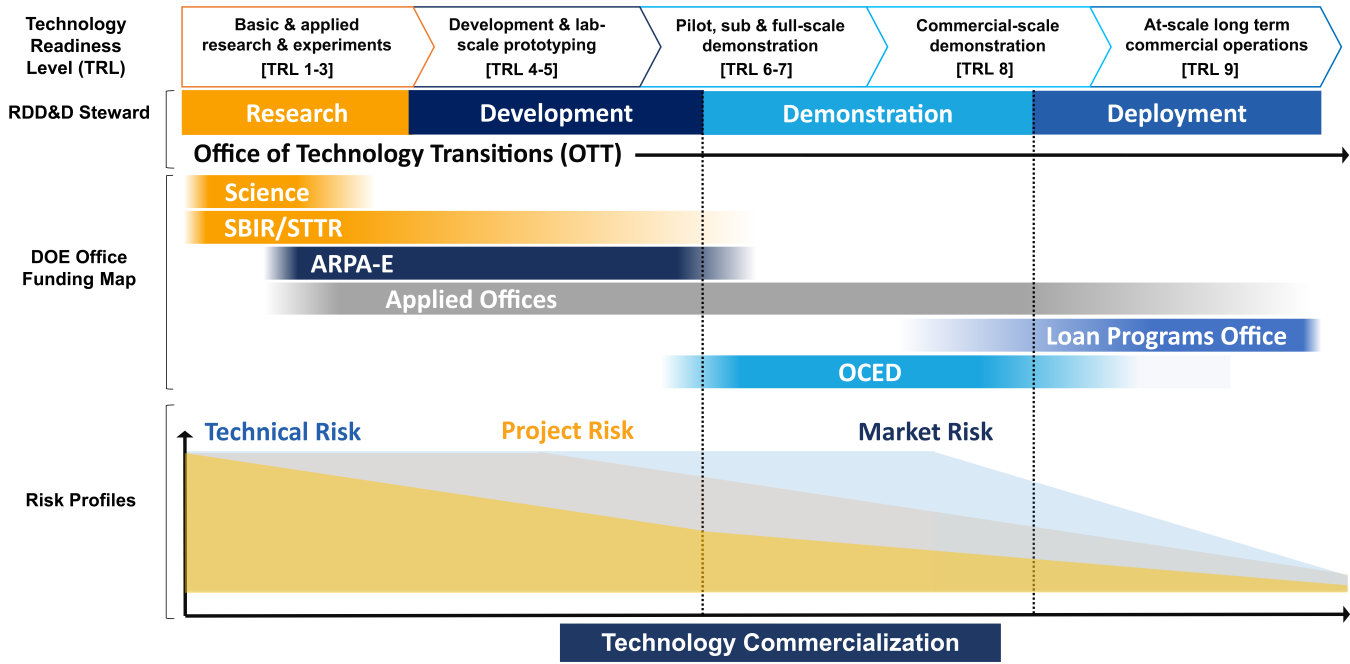To ensure the success of OCED-funded demonstration projects, we are focused on demonstration project management oversight excellence.

OCED is working to ensure appropriate front-end planning and due diligence of applications to account for lessons learned from prior demonstration projects.
OCED will implement its own portfolio of demonstration projects, as well as support other DOE programs as they manage capital-intensive, large-scale demonstration projects, to ensure a consistent approach to implementation across the agency. Further, OCED will share its expertise and learnings to continually improve technology demonstration projects at DOE.
OCED's Role Across Research, Development, Demonstration & Deployment
OCED fills an innovation gap to bring technologies from the pilot level to the deployment stage where the technology can be commercialized and adopted by the market.

Project Management Phases
OCED’s phased approach to project oversight incorporates well-established principles employed by government and the private sector. From conceptual design through construction and operations, each phase includes integrated stages and checks. Funding will be released in tranches and projects must past investment “go/no-go” decision points prior to receiving the next tranche of funding.
Below is a graphic that shows the OCED phased project management oversight approach. The funding percentages and schedule estimates are approximate and will vary with each project.

Application (Proposal Review and Selection):
- OCED receives full applications to Funding Opportunity Announcements (FOA). Internal and external reviewers that are experts in the subject matter of the FOA conduct rigorous reviews of eligible submissions to identify meritorious applications. The merit review process evaluates applications based on the criteria listed in the FOA.
- The DOE Selection Official(s) considers the recommendations of the reviewers with respect to individual proposals and makes a final selection of projects to begin the negotiation process.
- OCED then announces the projects selected for award negotiations.
Award Negotiations:
- Once projects are selected for award negotiations, the merit reviewers’ feedback may be used to inform project negotiations to further improve the projects before the first phase of funding is awarded.
- At the conclusion of negotiations, OCED will release a summary.
Following the negotiations and once an award is made, DOE uses a four-phase structure:
Phases 1-4:
- Phase 1 encompasses initial planning and analysis activities to ensure that the project is technologically, socially, and financially viable.
- Phase 2 finalizes engineering designs and business development, site access, workforce agreements, permitting, and offtake agreements.
- Phase 3, where the majority of the costs will occur, includes installation, integration, and construction activities.
- Phase 4 ramps-up the project to full operations including data collection to analyze the project’s activities.
OCED’s phased project management oversight approach allows the office to assess a project’s viability for continuation at major project milestones. Project funding for awardees is approved and made available in phases. OCED evaluates the status and quality of implementation at the “go/no-go” decision points at each phase, which will impact an awardee’s progression to the following phase. The next phase of funding is only made available to awardees if they successfully complete milestones in each phase and pass the “go/no go” decision point. At the “go/no-go” decision points, OCED may adjust or discontinue funding for the project based on the outcome of the evaluation.


